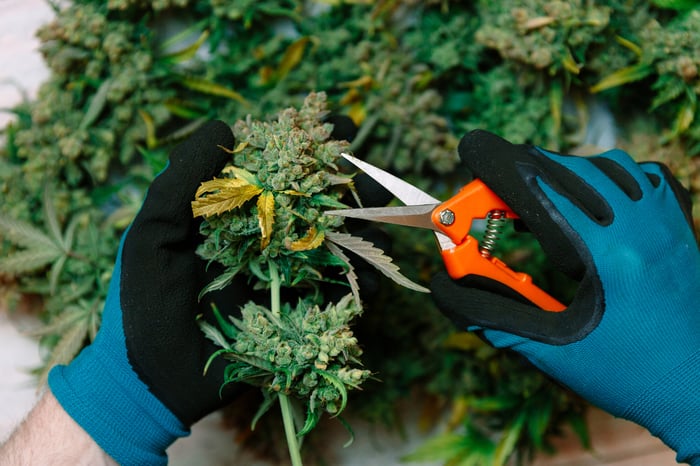At this time last year, the stock market was being whipsawed in a way that investors had never seen before. In roughly one month, the benchmark S&P 500 shed over a third of its value, while the CBOE Volatility Index (a measure of expected volatility in S&P 500 options contracts over the coming 30 days) hit an all-time high.
Yet amid this chaos, millennials and novice investors flocked to invest. We know this because online investing app Robinhood, which is known for its commission-free trades and gifting of free shares of stock to new users, gained approximately 3 million new members last year.
On one hand, it's fantastic to see young people putting their money to work in the world's greatest wealth creator. Then again, it's equally terrifying to see what millennials and novice investors have been buying.
In many instances, they're chasing penny stocks or momentum plays that are wildly detached from their underlying fundamentals. As of March, the following five Robinhood stocks fit the bill as investments that should be avoided like the plague.

Image source: Getty Images.
GameStop
Let's not beat around the bush: The list of companies that have skyrocketed on the heels of the retail-investor-fueled Reddit rally contains few winners. Video game and accessories retailer GameStop (GME) definitely isn't in the winners column.
GameStop caught fire in January after retail investors on Reddit's WallStreetBets chatroom agreed to band together to buy shares and out-of-the-money call options in the company. At the time, GameStop was the most short-sold stock of all publicly traded companies, making it the perfect target for a short squeeze. Take a quick glance at the company's three-month chart and you'll see that this short squeeze was effective.
The issue is that GameStop isn't a very good company. It's been brick-and-mortar based for more than two decades, which is a problem when gaming has shifted to digital platforms. Even with a more-than-quadrupling in e-commerce sales during the holiday season, GameStop's total sales still declined by 3%. Closing stores to reduce its expenses in an effort to backpedal into profitability isn't exactly a long-term strategy that'll pay off for investors.

Image source: Getty Images.
AMC Entertainment
If GameStop is the Batman of the Reddit-fueled frenzy, movie-theater operator AMC Entertainment (AMC -3.02%) is assuredly its Robin. AMC has been lifted by many of the same young investors that piled into GameStop, with its high short interest acting as a lure. Unfortunately, AMC's outlook might be even bleaker than GameStop's.
To begin with, AMC had to raise $917 million at the beginning of the year just to avoid bankruptcy. While it's possible that the administration of coronavirus vaccines could help life get back to normal sooner than later, this vaccination campaign will depend on the number of coronavirus variants in play, as well as how many Americans choose to get vaccinated. It wouldn't be a surprise if herd immunity and a return to normal life were pushed back into 2022. AMC may not have the capital to last that long.
Plus, even if AMC Entertainment survives this ordeal, the movie-theater operating model, as we know it, may not. AT&T subsidiary WarnerMedia is releasing all of its new movies in 2021 on HBO Max the same day they'll hit theaters. Likewise, Walt Disney is debuting some of its releases on Disney+ the same day they'll hit theaters. It's possible that convenience will trump the theater experience going forward.

Image source: Getty Images.
Aurora Cannabis
Once the most-held stock on the entire Robinhood platform, Canadian marijuana stock Aurora Cannabis (ACB 1.90%) is now the 18th most-held company. But that's still far too high for a company that's continually disappointed its shareholders.
Between June 2014 and the end of 2020, Aurora Cannabis increased its outstanding share count by more than 13,500%! It's financed more than a dozen acquisitions with its common stock, and its board has regularly approved at-the-market offerings that allow Aurora to raise capital by selling its stock. Even though the company's market cap has increased 39% over the trailing 12 months, its share price is down 32%. This disparity can be explained by three separate at-the-market programs being executed over the past year.
Aurora Cannabis is also an operational disaster. Part of the problem lies with Canadian federal and provincial regulators who have been slow to approve cultivation and retail licenses. But a lot of the blame also lies with Aurora grossly overestimating the industry's capacity needs and wildly overpaying for all of its acquisitions. With management moving the profitability goalposts further down the line on a handful of occasions, it has all the hallmarks of a Robinhood stock worth avoiding.

Image source: Getty Images.
Riot Blockchain
Few investments are hotter right now than cryptocurrency Bitcoin (BTC -0.44%). While there are no shortage of ways to invest in the crypto craze, I've argued that the worst possible way to invest in Bitcoin is to buy the companies that are mining it. That makes Riot Blockchain (RIOT -0.67%), one of the market's top-performing stocks over the trailing year, a stock to avoid like the plague.
To begin with, the cryptocurrency mining space is growing more crowded with each passing day, and the block rewards associated with validating groups of transactions on Bitcoin's network will halve every couple of years. Instead of an increased rate of return, Riot's growth outlook will almost certainly deteriorate over time.
What's more, Bitcoin has undergone three separate bear market corrections of at least 80% over the past decade. Cryptocurrency mining companies are essentially absent of innovation and entirely reliant on the rising price of Bitcoin to sustain their operations. If the world's largest cryptocurrency were to decline by 80% again, it's not even certain that Riot Blockchain would survive.

Image source: Getty Images.
Sundial Growers
Finally, investors should avoid Robinhood favorite Sundial Growers (SNDL -0.55%), which has replaced Aurora Cannabis as the most-held marijuana stock on the platform.
Sundial has rallied for many of the same reasons as GameStop and AMC. It has a lot of short interest and just so happens to be a penny stock, which makes it even more of a target in the eyes of young investors. But just like Aurora Cannabis, Sundial is full of shortcomings.
If you thought Aurora Cannabis' management needed to be placed in the corner and put on a time-out for its rampant dilution, you should take a closer look at Sundial. It's raised more than $600 million in cash since the end of September, but has issued over 1.1 billion shares of stock in the process. Sundial now has an estimated 1.66 billion shares outstanding, which'll make generating a meaningful per-share profit almost impossible.
To boot, Sundial's shift away from wholesale cannabis in favor of retail sales will lead to ugly year-over-year comparisons for the next couple of quarters. This comes as other North American pot stocks are turning the corner to profitability. Like Aurora, Sundial simply isn't a well-run company.





